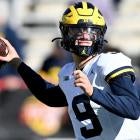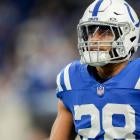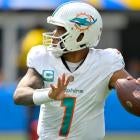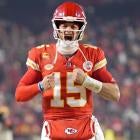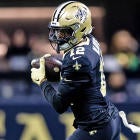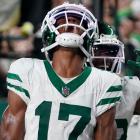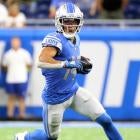DeAndre Hopkins got traded, Tom Brady left New England and Todd Gurley got cut. So much has happened over the first week of the new league year that it's a little hard to process it all.
One trend from a Fantasy perspective that's been great to see is how many moves meant good news for Fantasy. While it seems obvious when a team with a need finds a great fit, that's not how it always plays out, and the 2020 offseason has been one of the best from that perspective in recent memory. Let's go over Fantasy's biggest winners and losers from everything we've seen this week, and thankfully the positive side is the longer list.
Winners
There was already reason to be optimistic about Murray's Fantasy ceiling in Year 2 given his dual threat ability, a hopefully upgraded offensive line and just a second season for the offense to gel under Kliff Kingsbury. Adding DeAndre Hopkins just added a jet pack to that hype.
Two tight ends who have shown impressive efficiency as receivers on limited samples thus far are both now primed for expanded roles in 2020. Jarwin signed an extension as Jason Witten walked, which opens up starting snaps in Dallas. Hurst was acquired by the Falcons after Austin Hooper left town, and will slot into a potentially high-target role there.
Tom Brady
Brady shook up the football world by leaving New England, and his new situation in Tampa couldn't be better for a potential late-career resurgence. Yes, there's certainly potential he doesn't have the physical tools necessary to be a top 10 Fantasy quarterback anymore. But he led the NFL in passing yardage as recently as 2017 in his one season with Brandin Cooks, and if his struggles in 2018 and 2019 had more to do with a lack of downfield ability and a conservative game plan, Mike Evans, Chris Godwin and Bruce Arians will all improve that.
It's not clear what the Texans are doing, and they may yet add a receiver in the draft, but after giving Randall Cobb nearly $20 million guaranteed, Fuller is in position to see a target spike. Health will always be a concern, and he'll likely command more defensive attention without Hopkins across the field. That could limit his ability to get open downfield against one-on-one coverage, but opportunity is the name of the game, and this is still a net positive.
Drake was slapped with the transition tag and watched as David Johnson was shipped to Houston. Now Drake is almost certainly lined up to be the lead back in the same offense where he found considerable success down the stretch in 2019.
Todd Gurley, David Johnson
Two former elite Fantasy backs with current injury and effectiveness questions will both have opportunities to be Fantasy-relevant again on new teams. That's not to say that either should be considered anywhere near the first round in drafts — they shouldn't. And their situations aren't even equal, because Gurley joined a great situation for a free agent back in Atlanta while Johnson is just lucky someone wanted him enough to pay what they did, which would suggest he has the potential to be a lead back again. But in each case, the acquiring team clearly put value on the player, with Johnson's trade value being substantial and the Falcons making it known they were working to trade for Gurley (their cap situation made this difficult) before signing him within 24 hours of his release. Gurley's value should rebound into the top-24 backs, while Johnson goes from an afterthought in early drafts to a mid-round pick.
Darrell Henderson, Malcolm Brown
With the hefty dead money the Rams had to eat to release Gurley and a number of other holes to fill, they don't seem likely to add anything significant at running back. Instead, 2019 third-round pick Darrell Henderson should get some run after a very quiet 2019, while long-time backup Malcolm Brown will also compete for starter's touches. Henderson's prospect profile was strong and his ceiling is higher, but both backs are intriguing options for Fantasy.
So much of Allen's value is tied up in his mobility, and his accuracy — while improved in 2019 — still has a ways to go. But the addition of a high-end wide receiver like Stefon Diggs is an obvious bump, especially as the rest of his receiving corps from 2019 will return.
Nick Foles may not be a huge boost, but he's also likely better than any quarterback Robinson has played with. I'm still very high on Robinson's talent, especially considering what he's accomplished with Blake Bortles and Mitch Trubisky. Despite entering his seventh season in the league, Robinson is also just 26 years old until August. There's room for a career season.
Another quietly younger-than-you'd-expect player, Howard turned 25 last November and has racked up 3,895 rushing yards over four seasons, nearly 1,000 per year. He's not someone to be overly excited about and the Dolphins will likely add a back in the draft, but there's potential for some solid Fantasy value after Miami handed over nearly $5 million in guarantees, a not insignificant number for a running back.
Colts pass-catchers
Philip Rivers is willing to let it ride, and despite his much-discussed interception issues, he's still an accurate quarterback. T.Y. Hilton, Jack Doyle, Nyheim Hines, Zach Pascal, Parris Campbell and whoever else the Colts might bring in all get a boost.
Christian McCaffrey, D.J. Moore
The Panthers' top two receiving weapons already had massive Fantasy value so it's difficult to call them winners, but at least relative to the alternatives this offseason, Teddy Bridgewater is close to a best-case scenario. Bridgewater is an accurate passer who likes to stick to underneath throws, and his average throw depth was lowest among all quarterbacks with at least 200 dropbacks in 2019. Expect McCaffrey and Moore to rack up targets again in 2020.
The additions of Austin Hooper and tackle Jack Conklin, plus the tender placed on Kareem Hunt, all improve Mayfield's supporting cast for 2020. A new coaching staff doesn't hurt either, after Freddie Kitchens seemed overmatched in 2019. There will be plenty of pressure on Mayfield to bounce back from a disappointing 2019 — and few excuses if he doesn't.
Losers
Austin Hooper, Browns skill position players
Hooper's signing with the Browns was good for Mayfield, but it's hard to imagine enough targets to go around in Kevin Stefanski's offense. The Browns appear destined to run plenty of two-tight end sets — Stefanski's Vikings did on over 50% of snaps last year — and that should mean a decent amount of running with Nick Chubb. But even if they pass a decent amount, Jarvis Landry, Hooper, Hunt and Chubb are all competing for short-area targets, while Odell Beckham could be in a similar target-deficient position as Stefon Diggs was in Minnesota last year as the main downfield option.
Keenan Allen, Austin Ekeler, Chargers skill position players
With Tyrod Taylor announced as the 2020 starter — at least until he's overtaken by the inevitable first-round draft pick — the Chargers go from the immobile Rivers to a quarterback in Taylor who relies on his athleticism. What that means is where Rivers tends to get the ball out at all costs, Taylor tends to hold it and both scramble and take sacks at very high rates. Their 16-game paces in recent seasons suggest Chargers receiving options would be looking at more than 100 fewer targets over a full season.
Waller was a late breakout at 27 years old, and a big part of that was due to a lack of alternatives in the Raiders' passing game and a quarterback in Derek Carr who loves targeting his tight ends. But late in the year, as rookie slot option Hunter Renfrow started to emerge, Waller's targets dropped off when the two shared the field, and now the Raiders have added Jason Witten for more competition on short-area targets. Add in that the Raiders are likely to draft a high-profile rookie wide receiver and Carr might cede some playing time (or even still be cut) to the recently-acquired Marcus Mariota or a potential rookie quarterback, and the great circumstances that led to Waller's 117-target season appear to be vanishing from all angles.
Melvin Gordon, Phillip Lindsay, Royce Freeman
I typically avoid committees in subpar offenses, and it's hard to see how the Broncos become an above average situation for running back Fantasy points. Freeman's redraft value falls to the very late rounds if he's not moved, while Gordon and Lindsay will split work in such a way as to potentially make both underwhelming for our game.
Watson is a gamer and a play-maker, and I'm not going to drop him nearly as far as I've seen others in the immediate aftermath of Houston's wild offseason moves. But you don't lose a receiver like Hopkins and avoid the "losers" list.
Stefon Diggs, John Brown
Brown's share of the Bills targets and air yards last season went up in smoke, and now Diggs has to catch passes from, well, just watch this.
Josh Allen, Stefon Diggs' new QB, is the worst deep passer in the NFL. He hit 15 of 59 attempts last season.
— QB Data Mine (@QBDataMine) March 17, 2020
25.4% pic.twitter.com/tbVCHCNwH5
In fairness, there's a possibility Diggs sees such a high share of targets that he overcomes Allen's inaccuracy, and it's not like the situation he left was great for Fantasy production.
Mike Evans
Going from Jameis Winston and his willingness to chuck the ball downfield, which helped Evans rack up air yards, to a 42-year-old quarterback with questions about his current arm strength is an obvious downgrade for a receiver with a career 14.7-yard average depth of target.
Ebron landed with the Steelers, who also restructured Vance McDonald earlier. It's hard to envision Ebron having a significant Fantasy impact in a passing game with an impressive trio of young receivers, a lack of recent tight end production and potential competition for snaps at the position.
The 49ers brought back Matt Breida, Jerick McKinnon and Jeff Wilson, so they are intent on maintaining plenty of bodies in their backfield.
Freeman is still unsigned, but he's unlikely to have much Fantasy value wherever he lands at this point.
Value unchanged
DeAndre Hopkins, Christian Kirk
I don't see the move as a big downgrade for Hopkins, though I understand why there could be some concern given spread offenses tend to equate to more even target distributions. I also don't see the acquisition as a big downgrade for Kirk, who could benefit from Hopkins' presence if Will Fuller's success with the Texans is any indication.
Bridgewater's underneath passing tendencies aren't great for Samuel, but he was already due for major regression after being the only receiver in the top 15 of total air yards last year to finish with fewer than 1,000 receiving yards, and not even being close with just 627. Kyle Allen really struggled with downfield accuracy, so it shouldn't take much for Bridgewater to be an improvement, and while Samuel's air yards will likely fall, his league-worst catchable target rate should definitely be expected to improve.
Dak Prescott, Amari Cooper, Ryan Tannehill, Derrick Henry
It's status quo for the Dallas and Tennessee offenses as they both brought back their main pieces from 2019.
There's little reason for optimism, but then there probably shouldn't have been anyway. In other words, it's not that the landing spot in Chicago was particularly bad — it's just that Graham probably doesn't have much left in the tank.













